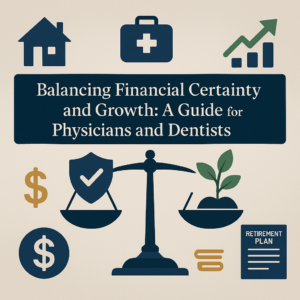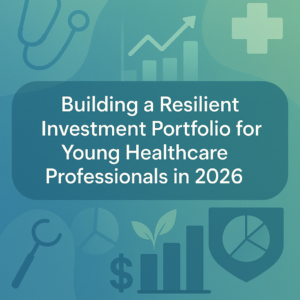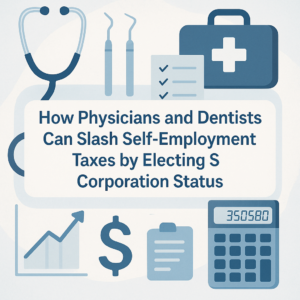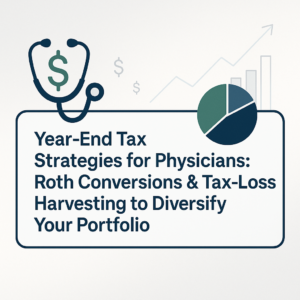Protecting Your Financial Health: Inherited Retirement Accounts for Young Healthcare Professionals
As a dedicated healthcare professional—whether you’re a physician, dentist, pharmacist, physical therapist, or psychologist—you spend your days caring for others. But when it comes to your own financial health, are you getting the right advice? Navigating the complexities of inherited retirement accounts can be daunting, especially when life’s unexpected events occur. This guide aims to provide you with the essential knowledge to make informed decisions that safeguard your financial future.
Understanding the Nuances of Inherited Retirement Accounts
Inherited retirement accounts, such as 401(k)s and Individual Retirement Accounts (IRAs), come with their own set of rules and tax implications. It’s crucial to understand these nuances to avoid costly mistakes. Missteps can lead to unnecessary taxes and penalties, which can significantly impact your hard-earned savings.
The Risks of Inadequate Financial Advice
Consider the story of a young professional who, after the unfortunate passing of a loved one, inherited a substantial 401(k) account. Seeking guidance, they consulted a financial advisor who recommended rolling the 401(k) into an IRA without considering the immediate financial needs and the individual’s age. This well-intentioned but misguided advice led to unexpected penalties for early withdrawals, as the recipient was under the age of 59½.
This scenario highlights the importance of working with advisors who specialize in retirement planning and are familiar with the specific needs of healthcare professionals. Inadequate advice can result in:
- Early withdrawal penalties of 10% for distributions taken before age 59½.
- Misinterpretation of Required Minimum Distribution (RMD) rules.
- Unnecessary tax burdens due to improper account handling.
Strategies for Managing Inherited Accounts
To avoid these pitfalls, it’s essential to consider the following strategies when managing inherited retirement accounts:
Option 1: Establish an Inherited IRA
An Inherited IRA (also known as a Beneficiary IRA) allows you to keep the funds tax-deferred while giving you the flexibility to withdraw money as needed without incurring early withdrawal penalties.
- Penalty-Free Access: As a non-spousal beneficiary, you can take distributions at any age without the 10% early withdrawal penalty.
- Tax Considerations: Distributions are subject to income tax but spread over time, potentially reducing your annual tax burden.
- Required Minimum Distributions: Be aware of the RMD rules, which typically require the account to be fully distributed within ten years of the original owner’s death.
Option 2: Spousal Rollovers—Proceed with Caution
If you are a spouse beneficiary, you have the option to roll over the inherited 401(k) into your own IRA. While this may be beneficial for some, it’s important to consider your age and financial needs.
- Age Matters: If you’re under 59½ and need access to the funds, rolling into your own IRA may subject you to early withdrawal penalties.
- Financial Flexibility: A spousal rollover may limit your ability to access funds penalty-free compared to keeping the assets in an Inherited IRA.
Option 3: Utilize Section 72(t) Distributions
If you’ve already rolled over into your own IRA and are under 59½, Section 72(t) of the Internal Revenue Code allows you to take substantially equal periodic payments (SEPPs) to avoid the early withdrawal penalty.
- Strict Rules Apply: Payments must continue for five years or until you reach 59½, whichever is longer.
- Inflexibility: Modifying the payment schedule can result in retroactive penalties.
- Complex Calculations: It’s advisable to work with a knowledgeable financial advisor to set up SEPPs correctly.
The Importance of Specialized Financial Advice
As a healthcare professional, your financial situation may include unique factors such as significant student loan debt, fluctuating income during residency, or the need to plan for private practice expenses. Working with a financial advisor who understands these nuances can make a significant difference.
What to Look for in an Advisor
- Experience with Healthcare Professionals: Advisors familiar with your profession can provide more tailored advice.
- Retirement Planning Expertise: Look for credentials such as Certified Financial Planner (CFP®).
- Fiduciary Responsibility: Advisors who are fiduciaries are legally obligated to act in your best interest.
Questions to Ask Potential Advisors
- How familiar are you with the financial challenges faced by young healthcare professionals?
- Can you explain the rules surrounding inherited retirement accounts?
- What strategies do you recommend for managing student loan debt while planning for retirement?
- How are you compensated for your services?
Taking Control of Your Financial Future
Dealing with the loss of a loved one is never easy, and financial complexities can add stress during an already challenging time. By educating yourself and seeking specialized advice, you can make informed decisions that protect your financial well-being.
Action Steps for Healthcare Professionals
- Assess Your Immediate Financial Needs: Determine if you need access to the inherited funds in the short term.
- Understand Your Options: Research the differences between Inherited IRAs and spousal rollovers.
- Consult a Specialized Financial Advisor: Find an advisor experienced in working with healthcare professionals and inherited retirement accounts.
- Create a Comprehensive Financial Plan: Incorporate the inherited assets into your overall financial strategy, considering debt management, savings, and retirement goals.
Conclusion
Your dedication to others’ well-being is commendable. Ensure that you give the same level of care to your financial health by making informed decisions and seeking expert guidance. Proper management of inherited retirement accounts can provide financial security and peace of mind as you continue to build your career in healthcare.
Remember, the right advice today can significantly impact your tomorrow. Take the time to consult with professionals who have your best interests at heart, so you can focus on what you do best—caring for others.






